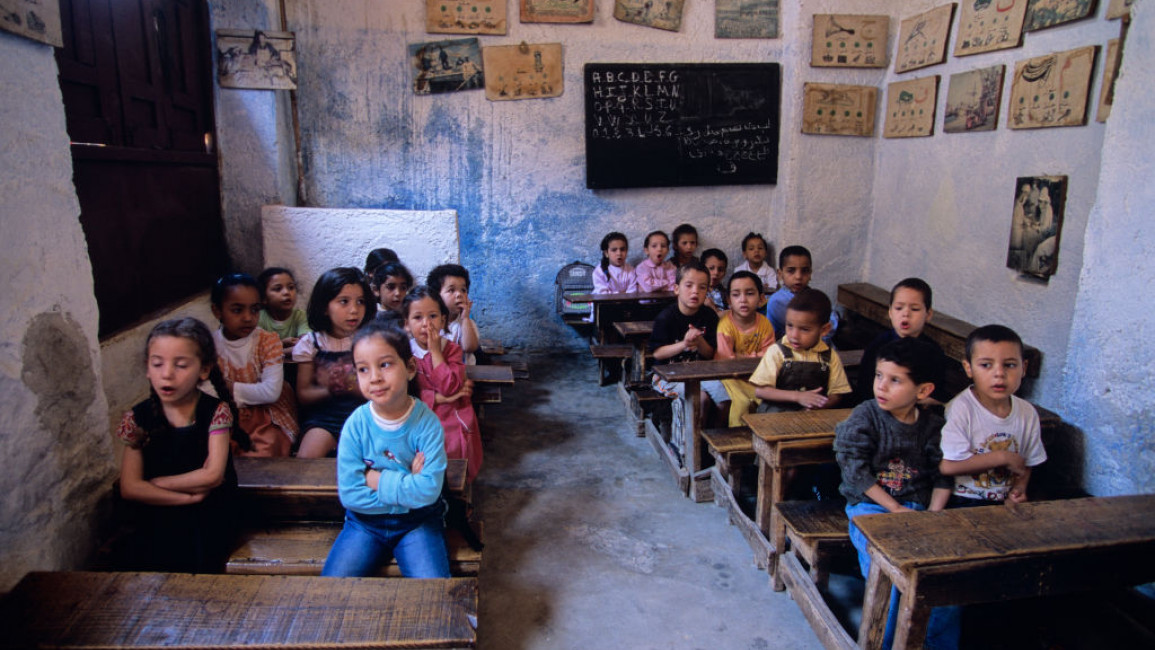After decades of French-centered education, Morocco vows a future with more English and Tamazight
Morocco is set to kick off the next school year with an Amazigh, English focused-curriculum, shifting the scope from the state's longly beloved language, French.
Last week, Morocco's Ministry of Education announced "the generalisation" of teaching English in the country's public middle schools to promote linguistic diversity.
"This measure also aims to establish equal opportunities between public schools and private establishments, where the English language is taught from primary school," explained a spokesperson from the ministry to The New Arab.
Currently, English is taught from the third year of public college, but the ministry plans to gradually extend its teaching to 10% of first-year students and 50% of second-year college students, from the next school year.
"By the 2025-2026 school year, the generalisation of the learning of English will cover 100% of public middle schools in the country," added the ministry's spokesperson.
The recent step in the country's journey towards implementing English aims to establish "linguistic pluralism in a progressive and balanced way", says the ministry.
In October 2022, the Moroccan Ministry of Education promised a soon future where scientific subjects will be taught in English instead of French. The plan is still on standoff until providing English training for science teachers.
The training programs are a serious struggle in the North African kingdom's road to strengthening the presence of English and Tamazight, the Amazigh language.
Over the weekend, the ministry published a report detailing the state's plan to make Tamazight an essential component in the curriculum of public primary schools starting next year.
Though the generalisation of Tamazigh in all the country's public schools will take up to ten years, according to the ministry plan.
After decades of fighting for Tamazight education, Amazigh activist Adil Adaskou argues that waiting another decade will be unnecessary if the state "took the indigenous language more seriously."
As part of Morocco's 2023 Finance Bill, the government allocated a budget of MAD 300 million (around US$27.5 million) to the Ministry of Digital Transition and Administrative Reform to accelerate the integration of the Amazigh language in public administrations.
Though, the Ministry of Education "allocates only 400 positions for Tamazight teachers per year, at a time when Tamazight needs more than that in order to achieve generalisation," explained the Amazigh activist.
Morocco holds the majority of the Tamazight-speaking population with estimates of 60% - 80% of the population speaking Tamazight.
UNESCO lists that one of the major reasons for the endangerment of this language is that "Tamazight speakers were discouraged from using their own language and government policies were adopted that accelerated its decline."
Until this day, the main way that Amazigh is learned and passed from generation to generation is through growing up with it as a mother tongue.
Morocco's constitution recognises Arabic and Tmazight as the official languages of the country.
French is the first foreign language in the North African kingdom with English, Spanish and German ranked after.
Though, several bureaucratic procedures in Morocco are still done, solely, in French.
In the last years, Morocco and Algeria have both headed to end their dependence on their former coloniser's language.
The North African states' new pro-English direction coincides with their fury with Paris over several diplomatic and political issues.

![Trump's warm greeting to Netanyahu contrasted with Kamala Harris's critical reception [Getty]](/sites/default/files/styles/image_212x120/public/2024-07/GettyImages-2162908988.jpg?h=69f2b9d0&itok=uRh_9WXh)
![The brutal assault on Khan Younis has killed dozens and displaced thousands more [Getty]](/sites/default/files/styles/image_330x185/public/2024-07/GettyImages-2162526709.jpg?h=d3eda8cf&itok=n5N-o8p5)
![Members of the Algerian delegation threw roses into the Seine [Getty]](/sites/default/files/styles/image_330x185/public/2024-07/GettyImages-2162980872.jpg?h=199d8c1f&itok=h_3o_TOL)